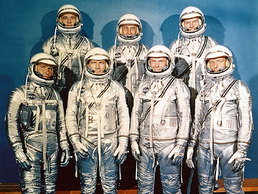
“Didn’t quite copy that. Say again.”
“I said ‘Everything’s A-OK.’”
-- Radio dialogue between astronaut Alan Shepard and capcom Gordon Cooper, The Right Stuff (1983)
Being something of a space nut, I hope I’m forgiven for reaching into that well again this week….
NASA appears to be on a public opinion high unlike anything seen in decades. In the last month alone we’ve seen the successful landing of the Curiosity rover on Mars, the discovery of possibly millions of black holes via the WISE space telescope, the launch of twin probes to study the Van Allen radiation belt, a milestone for the Juno probe headed for Jupiter, and the 35th anniversary of the longest-lived—and farthest away—operational probe, Voyager 1, now at the edge of interstellar space. All of this happens as the most renowned of astronauts, Neil Armstrong, passes away—a somber event, yet one that turned hearts and minds back to the Apollo era.
As a child of the Space Age, I sense a resurgence of the enthusiasm that put such stellar achievements on the front pages of newspapers in the 1960s and early ‘70s. It’s a nice change after 30 years of largely ho-hum reactions to the Space Shuttle and the International Space Station, spiked occasionally with a Hubble or a Sojourner or a Cassini or a Spirit and Opportunity.
And there’s more to come. Curiosity is just starting to stretch its wheels in Gale Crater. Cassini is still cruising ringed Saturn and its moons. The Dawn spacecraft has wrapped up its study of the asteroid Vesta and is preparing to voyage to dwarf planet Ceres. New Horizon is less than three years from its encounter with Pluto. The ISS and its rotating crews continue their scientific work aloft. And private industry is partnering with NASA on such ventures as the Dragon cargo ship.
For NASA workers, it must be pleasant to high-five each other—yay, Mohawk Guy!—rather than have to deal with disasters like Columbia and Challenger, or embarrassments like Hubble’s initial nearsightedness or the crash of the Mars Polar Lander.
The reality, of course, is that space exploration involves both great achievement and great tragedy. In
NASA’s case, a combination of hamstrung budgets and lack of national will have made the agency with the demeanor of a kicked puppy rather than that of a prize-winning purebred.
Yet NASA seems to be learning. Science is cool, but talking about science isn’t always sexy. So things like sharing hi-res photos online almost immediately after Curiosity landed, or transmitting a will.i.am song to the Red Planet (*sigh* Why not Led Zeppelin?), or even a loop over New York City with a piggybacked Shuttle—these are efforts that are cool, that make the space program a little more real to the public. And the more real space appears to be to the average Joe and Jane, the more support NASA is likely to glean in the years ahead.
It’s good public relations—allowing people to be part of the fun, to participate in the story.
Let’s hope NASA continues to keep things, um, “A-OK.”

 RSS Feed
RSS Feed
